“Canadian housing prices will fall 10% over the next several years and homebuilding will slow sharply in 2013, but the country’s recent property boom is not expected to end in a U.S.-style collapse, according to a Reuters poll.
The survey of 20 forecasters published on Friday showed the majority believe the Canadian government has done enough to rein in runaway prices, preventing the type of crash that has devastated the U.S. market for years.
“This isn’t a sharp correction, this isn’t a U.S.-style correction, it’s just simply an unwinding of the excess valuation that was created by artificially low interest rates for a long period of time,” said Craig Alexander, chief economist at Toronto-Dominion Bank.
“I would emphasize that while a 10% correction sounds scary, in actual fact, this would be a healthy outcome.”
…
“Vancouver prices were forecast to fall 2.7% in 2012 and 3.8% in 2013, with an eventual decline of 12.5%.”
– from ‘Canada home prices seen falling, but not crashing’, Andrea Hopkins, Reuters via Financial Post, 9 Nov 2012
“Canada’s house prices are expected to drop and stay down for a decade, says a new report from Scotiabank that also warns of an “adverse shock” to the economy when the decline comes.
The bank’s latest housing outlook predicts a 10-per-cent price decline across Canada in the next two to three years, driven by larger declines in the Toronto and Vancouver markets, “where supply risks and affordability pressures have the potential to trigger larger price adjustments.”
The report notes that previous housing market downturns — in the 1970s and 1990s — took eight or nine years to bounce back to price levels seen before the decline.
“Historically, long cycles of rising home prices have been followed by extended periods of persistent softness, allowing affordability to be gradually restored and generating renewed pent-up demand,” the report stated.
The bank also warned that “balance sheets heavily skewed to real estate leave Canadians vulnerable to an adverse shock, including a sharp rise in unemployment and/or a sharp drop in home prices.”
– from ‘Canada House Prices To Drop, Stay Down For A Decade, Causing Unemployment, Scotia Says’, Daniel Tencer, The Huffington Post Canada, 8 Nov 2012.
Analysts in the industry are largely commentators, rather than instruments with any convincing positive predictive capacity. Their predictions are noteworthy to the extent that up until very recently there was a broadly held belief that housing prices would not fall at all. So, for the media to be announcing even the idea of coming drops is significant. But, from a quantitive perspective, their consensus about price drops being relatively benign reflects characteristic hope over substance.
Based on the size and all-consuming pervasiveness of the speculative mania, and on price levels determined by fundamentals such as rental incomes, we foresee larger than 10% drops for the nation and far, far larger drops for Vancouver (50%-66% real, peak to trough). Aren’t we already at about 10%-12%-off for most RE sub-types in Vancouver?
And another point: it took 25 years for real prices from the 1980-81 peak to be regained in Vancouver, not 10.
– vreaa




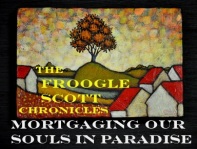




















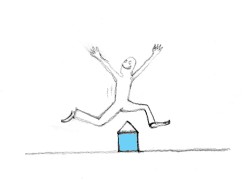

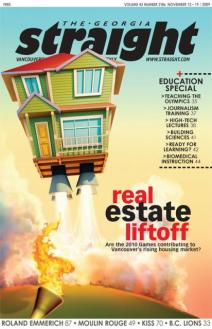




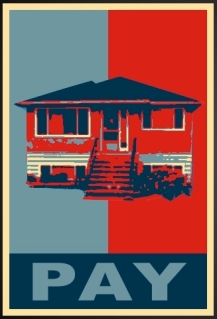
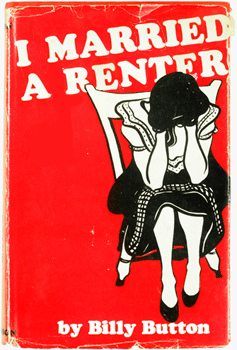
Well that works for me. Even if that were true (which it isn’t) renters still win. I currently pay between two and three percent of the appraised value in annual rent for my 3,000 sq. ft. Victoria home in a prime residential area. There is a man on my roof right now, fixing the chimney. I am not paying him. My landlord is. If prices don’t drop, I win, because my rent is so cheap compared to value (as virtually all Victoria rents are). If prices do drop, I win, because I won’t have been sucked into the bubble. My real question is, when do people realize that lower housing prices benefit virtually everybody (except those who buy and sell at the peak of the market)? Every day I see another restaurant or local retailer out of business. People are so strung out on house debt that they have nothing left over to spend in the community. Everybody loses.
“People are so strung out on house debt that they have nothing left over to spend in the community.”
bears repeating.
Love the picture…
It’s funny how “analysts” use the word ‘healthy’. Prices rising by 10% or 20% a year are healthy. A mild correction according to their wishes is also healthy. I guess that the great debt tumor that enabled this “health” is invisible to them.
I only half blame analysts here. They seem to be pandering to their readers who want strong definitive advice, not a whole bunch of estimates with caveats. A few shops do this but not many. If they are going to make predictions on house prices they need to
– Include predictions in the short, medium, and dare I say it long terms with rationale
– Deal directly with US experience with price-rent ratios and Bob Shiller’s long term inflation-adjusted house price analysis (where he predicts prices to revert to the long-term average) and explain why these analyses are not relevant to Canada
– Include risks in their predictions with upper and lower bounds under various stress scenarios (e.g. slower income growth, commodity price recession, and household credit contraction)
The problem here is that this type of analysis is difficult to elucidate to people in a page of a quarterly market update. As I mentioned I’ve seen a few reports form investment shops that are much more honest with risks to the Canadian housing market. People need to read these reports and ask some very harsh questions to their financial advisors if their reports are not including these details.
No matter which side of aisle you look at it, it all goes back to Keynes vs Hayek analysis. Most bank analysts’ reports are dominated by Keynesianism (the way they’re taught in school), who believe the government and central bank must compensate for lost output by way of fiscal reforms and easing monetary policy, respectively. They just can’t imagine the government letting home prices fall that fast without intervening. I agree somewhat and already see it with all these home assistant programs and work-out agreements.
All in all, they may slow the decline in the short term, but what they can’t control is when buyers’ confidence plunges and exceeds the government’s ability to offset downward pressures. Then the market just rolls over and accelerates downwards into a crash, as Hayekians predict.
Just to add. This is what’s going on right now all across Canada. Link
Genworth Financial recently presented to Royal LePage agents about mortgage insurance and their Homeowner Assistance Program, designed to provide relief to homeowners experiencing temporary financial difficulties as the result of an unexpected life event.
The company insures thousands of high-ratio mortgages and negotiates “workouts” with clients experiencing legitimate financial difficulty including job loss, divorce, or unexpected illness. Their goal is to protect the lender from financial loss and provide homeowners with the breathing room they need to stay in their home.
Genworth says each situation is assessed individually, however with early intervention most people are able to negotiate “workouts” that allow them to stay in their house by deferring payments, increasing the amortization period, or even receiving help selling their house to cover any loan shortfalls.
Assistance isn’t guaranteed, however Genworth does its best to work with banks and investors to negotiate loan modifications making it possible for clients to avoid foreclosure or bankruptcy.
In other words, taxpayers are implicitly bailing out distressed homeowners via Genworth’s 90% government-backed guarantee.
And what is their analysis based on?Don’t give me that “it can’t happen here because it’s different BS”. Prices dropped in many desirable places in the US. Vancouver is NO DIFFERENT. Prices are already dropping and “average prices” have already dropped 10-12% from peak. Yes, “average” is a poor substitute for “median” as a central tendency parameter in housing but the bulls always used “averages” when describing the upswing, so it’s only fair bears use “averages” when describing the fall. In many cases, it’s worse in Vancouver. People taking out HELOC to buy expensive goods they DON’T NEED. Spending money on depreciating assets (luxury vehicles, vacations, designer clothes, etc.).Foreign investment is drying up. Money from China is not infinite. When prices fall, the ones left standing will be the ones who didn’t jump in, or the ones who are truly rich and jumped in, but can afford the price drops.
Before Lehman Brothers went bust, had there been analysts/experts/credit rating agencies predicting it?
http://en.m.wikipedia.org/wiki/David_Einhorn_(hedge_fund_manager)
I thought that 9 out of 10 analysts, or REALTORS (TM) they’re all cut from the same cloth, errrrr, roll of paper, said that there was no housing bubble, prices would never drop, and that there was nothing to see here.
“And another point: it took 25 years for real prices from the 1980-81 peak to be regained in Vancouver, not 10.”
So you’re saying 1981 prices are equal to 2006 prices? Am I really that tired?
No, you read correctly.
If one bought at the Vancouver peak in 1980-81, you had to wait until 2006 to see the same real prices. ‘Real’, of course, meaning correcting for inflation.
No joke; no error.
Whats inflation?
That’s measured in 2002 dollars, which is skewed since Canada adopted formulas from the Boskin commission report around 1995.
CPI too high? StatsCan has inflation measure wrong, but not in the way Canadians think: report
CPI too low?Study says Canada CPI doesn’t catch housing bubbles
Let them figure it out. In the meantime, using home prices against commodities is the best long-term measurement.
The CPI is weighted 1/5 with home prices. Does one compare a basket of five apples to four oranges and one apple? The genius economists say yes.
So VREAA I have an observation. I’ve been following a few areas on the N Shore for round a year now. here goes: 1. almost NOTHING has sold; 2. prices have remained flat.. at best, maybe some have dropped around 8-10%. Now, what i don’t know (cos there’s no zoopla in Canada) is how far below the ask the sales prices were. In the light of the original analyst comments, do you have any views on this? Thanks – Craig
Hey, craig, it’s always a great time to buy!
Don’t ask questions, just dive right in – but call your local realtor first!
@Craig Sterling, irony aside, your local realtor might be of help here, some of them are actually very nice decent people especially the ones that are in this profession for a long time, not the last years stickers. I am a perspective client to one very nice older realtor lady and she subscribed me to the PCS (Private client services), so I have an access to a database for my chosen areas and I can see what the inside information for the listing – I have it for Richmond and Tsawwassen, for under 1 mil property listed price – it was set by her by my request. In Richmond as far as I can see, the sold price is about 10% less than the asking one and also there are multiple cases when the property underwent the price drop before of the sales terms negotiations – which is good in my books as the sale prices are going to be reflected in the next year’s tax assessment and give the homeowners more realistic starting point when they decide to sell.
Now you can even make money on your deposit!
http://www.liveatwest.com/home.html
They are getting more and more desperate
Great find, a promotion we haven’t seen before in Vancouver (to the best of our recollection). Thanks, will headline.
Bosa was also a guest at our meeting and announced that they are giving 24 post dated cheques for rent for the next two years to investors in their new building called Viceroy in New Westminster which is now 50% sold out.
From June 2011.
Craig -> “what i don’t know (cos there’s no zoopla in Canada) is how far below the ask the sales prices were.”
—
Agree it’d be really, really invaluable to have a Canadian zillow equivalent.
(I’d expect such developments in the trough, when everybody is up in arms about who/what caused the bust).
As you know, vancouverpricedrop does a great job of documenting prices falling from original ask price.
And, as you likely also know, the really important numbers are time1 to time2 sales. The kind of sale-resale figures that Case-Shiller and Teranet try to capture.
So I just came back from a work trip in San Diego.
The contacts I was working with asked me where I am from and when I mentioned Vancouver they said isn’t that one of the most expensive places to live in North America.
So I asked them are you guys still affected by the housing bubble, and they went off. They said it was horrible, a coworker bought a place for 700k around 08 and now its worth 450k, if he could sell it. They thought prices will not be back for 10 years or more. At the time everyone was saying it is a great time to buy. Even though prices have fallen and interest rates are at rock bottom the mentality of ownership is gone.
I told them a 1 br condo here would go around 330, and they thought I was talking about a luxurious waterfront condo. I told them the house I was living in is probably worth 800k+, again they asked, in downtown? I am renting 1/3 of it for 800 including all utilities. They said why would anyone buy?
@craig
dont even think about buying anything on the north shore. especially west vancouver. its gonna crash harder than anywhere else, wait until the next stats come out. it will be even worse as nothing has sold in the past 3 weeks.
thanks JJ – craig
Craig, I live in Capilano area, bought in 05′. Our house at peak was about $1.3M, and now I expect we’d be lucky to get $1.1M – that’s a minimum 15% drop. We’re staying cause we need a place to live with kids etc. but also cause we paid $600k, which is where it could go back to.
Other houses up the street have lowered from $1.2 to $1.0M and are still not selling. You should watch out and get the full story before you jump in.